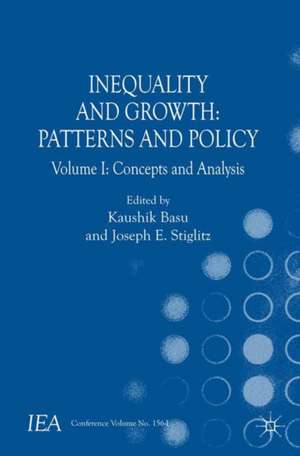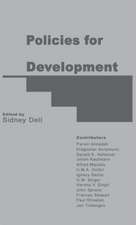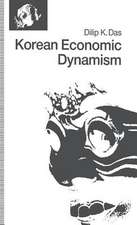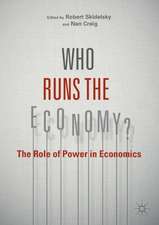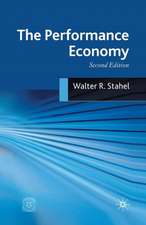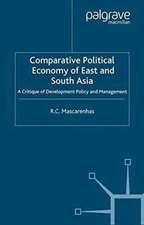Inequality and Growth: Patterns and Policy: Volume I: Concepts and Analysis: International Economic Association Series
Editat de Kenneth A. Loparo, Joseph E. Stiglitzen Limba Engleză Paperback – 6 apr 2016
| Toate formatele și edițiile | Preț | Express |
|---|---|---|
| Paperback (2) | 640.06 lei 6-8 săpt. | |
| Palgrave Macmillan UK – 6 apr 2016 | 640.06 lei 6-8 săpt. | |
| Palgrave Macmillan UK – 6 apr 2016 | 641.20 lei 6-8 săpt. | |
| Hardback (2) | 646.30 lei 6-8 săpt. | |
| Palgrave Macmillan UK – 4 apr 2016 | 646.30 lei 6-8 săpt. | |
| Palgrave Macmillan UK – 4 apr 2016 | 647.59 lei 6-8 săpt. |
Din seria International Economic Association Series
-
 Preț: 449.42 lei
Preț: 449.42 lei - 15%
 Preț: 644.18 lei
Preț: 644.18 lei -
 Preț: 391.61 lei
Preț: 391.61 lei - 18%
 Preț: 951.29 lei
Preț: 951.29 lei - 15%
 Preț: 656.25 lei
Preț: 656.25 lei - 18%
 Preț: 1224.36 lei
Preț: 1224.36 lei - 18%
 Preț: 955.56 lei
Preț: 955.56 lei - 8%
 Preț: 589.70 lei
Preț: 589.70 lei - 18%
 Preț: 974.98 lei
Preț: 974.98 lei - 15%
 Preț: 648.89 lei
Preț: 648.89 lei - 15%
 Preț: 640.24 lei
Preț: 640.24 lei - 15%
 Preț: 640.06 lei
Preț: 640.06 lei - 18%
 Preț: 950.66 lei
Preț: 950.66 lei - 15%
 Preț: 643.34 lei
Preț: 643.34 lei - 18%
 Preț: 1241.10 lei
Preț: 1241.10 lei - 15%
 Preț: 645.47 lei
Preț: 645.47 lei - 18%
 Preț: 1225.62 lei
Preț: 1225.62 lei - 9%
 Preț: 1148.26 lei
Preț: 1148.26 lei - 18%
 Preț: 1234.14 lei
Preț: 1234.14 lei - 18%
 Preț: 961.86 lei
Preț: 961.86 lei - 18%
 Preț: 957.62 lei
Preț: 957.62 lei - 18%
 Preț: 955.08 lei
Preț: 955.08 lei - 18%
 Preț: 953.52 lei
Preț: 953.52 lei - 18%
 Preț: 949.10 lei
Preț: 949.10 lei - 15%
 Preț: 646.30 lei
Preț: 646.30 lei - 15%
 Preț: 642.51 lei
Preț: 642.51 lei - 18%
 Preț: 963.77 lei
Preț: 963.77 lei - 18%
 Preț: 1217.90 lei
Preț: 1217.90 lei - 15%
 Preț: 642.51 lei
Preț: 642.51 lei - 18%
 Preț: 952.89 lei
Preț: 952.89 lei -
 Preț: 393.52 lei
Preț: 393.52 lei - 18%
 Preț: 1222.01 lei
Preț: 1222.01 lei -
 Preț: 385.84 lei
Preț: 385.84 lei -
 Preț: 390.25 lei
Preț: 390.25 lei - 15%
 Preț: 644.18 lei
Preț: 644.18 lei - 18%
 Preț: 1225.62 lei
Preț: 1225.62 lei - 15%
 Preț: 643.65 lei
Preț: 643.65 lei - 18%
 Preț: 1223.11 lei
Preț: 1223.11 lei - 18%
 Preț: 955.70 lei
Preț: 955.70 lei - 18%
 Preț: 1238.23 lei
Preț: 1238.23 lei - 9%
 Preț: 1148.26 lei
Preț: 1148.26 lei - 15%
 Preț: 650.37 lei
Preț: 650.37 lei - 15%
 Preț: 645.60 lei
Preț: 645.60 lei - 15%
 Preț: 640.88 lei
Preț: 640.88 lei - 18%
 Preț: 960.42 lei
Preț: 960.42 lei - 18%
 Preț: 954.77 lei
Preț: 954.77 lei - 18%
 Preț: 1219.46 lei
Preț: 1219.46 lei
Preț: 640.06 lei
Preț vechi: 753.01 lei
-15% Nou
Puncte Express: 960
Preț estimativ în valută:
122.48€ • 126.35$ • 102.21£
122.48€ • 126.35$ • 102.21£
Carte tipărită la comandă
Livrare economică 26 martie-09 aprilie
Preluare comenzi: 021 569.72.76
Specificații
ISBN-13: 9781137554536
ISBN-10: 1137554533
Pagini: 256
Ilustrații: XXIX, 256 p.
Dimensiuni: 155 x 235 x 15 mm
Greutate: 0.41 kg
Ediția:1st ed. 2016
Editura: Palgrave Macmillan UK
Colecția Palgrave Macmillan
Seria International Economic Association Series
Locul publicării:London, United Kingdom
ISBN-10: 1137554533
Pagini: 256
Ilustrații: XXIX, 256 p.
Dimensiuni: 155 x 235 x 15 mm
Greutate: 0.41 kg
Ediția:1st ed. 2016
Editura: Palgrave Macmillan UK
Colecția Palgrave Macmillan
Seria International Economic Association Series
Locul publicării:London, United Kingdom
Cuprins
Introduction: Inequality and Growth: A Preamble; Kaushik Basu, Joseph E. Stiglitz and Vivian Hon
1.New Theoretical Perspectives on the Distribution of Income and Wealth Among Individuals; Joseph E. Stiglitz
2.Reflections on the 'Equity and Development' World Development Report Ten Years Later; Francois Bourguignon
Commentary: Equity and Development: Revisiting the 2006 World Development Report; Martin Ravallion
3.Person Equivalent Headcount Measures of Poverty; Tony Castleman, James E. Foster and Stephen C. Smith
Comments on 'Person Equivalent Headcount Measures of Poverty'; Bhaskar Dutta
4.How Useful is Inequality of Opportunity as a Policy Construct?; Ravi Kanbur and Adam Wagstaff
Comments on 'How Useful is Inequality of Opportunity as a Policy Construct?; Aristomene Varoudakis
5.Towards a New Definition of Shared Prosperity: A Dynamic Perspective from Three Countries; Hai-Anh H. Dang and Peter Lanjouw
Comments on 'Welfare Dynamics Measurement: Two Definitions of a Vulnerability Line and their Applications'; Sudhir Anand
6.Behavioral Economics and Social Exclusion: Can Interventions Overcome Prejudice?; Karla Hoff
Origin and Evolution of Cognitive Frames: Comments on 'Behavioral Economics and Social Exclusion: Can Interventions Overcome Prejudice?'; Paola Giuliano
7.The Effects of Fiscal Redistribution; Michele Battisti and Joseph Zeira
Comments on 'The Effects of Fiscal Redistribution'; James E. Foster
8.Inequality of Happiness: Evidence of the Compression of the Subjective Well-being Distribution with Economic Growth; John Ifcher and Homa Zarghamee
Why focus on Subjective Well-Being inequality?: Comments on 'Inequality of Happiness: Evidence of the Compression of the Subjective Well-being Distribution with Economic Growth'; Murray Leibbrandt
1.New Theoretical Perspectives on the Distribution of Income and Wealth Among Individuals; Joseph E. Stiglitz
2.Reflections on the 'Equity and Development' World Development Report Ten Years Later; Francois Bourguignon
Commentary: Equity and Development: Revisiting the 2006 World Development Report; Martin Ravallion
3.Person Equivalent Headcount Measures of Poverty; Tony Castleman, James E. Foster and Stephen C. Smith
Comments on 'Person Equivalent Headcount Measures of Poverty'; Bhaskar Dutta
4.How Useful is Inequality of Opportunity as a Policy Construct?; Ravi Kanbur and Adam Wagstaff
Comments on 'How Useful is Inequality of Opportunity as a Policy Construct?; Aristomene Varoudakis
5.Towards a New Definition of Shared Prosperity: A Dynamic Perspective from Three Countries; Hai-Anh H. Dang and Peter Lanjouw
Comments on 'Welfare Dynamics Measurement: Two Definitions of a Vulnerability Line and their Applications'; Sudhir Anand
6.Behavioral Economics and Social Exclusion: Can Interventions Overcome Prejudice?; Karla Hoff
Origin and Evolution of Cognitive Frames: Comments on 'Behavioral Economics and Social Exclusion: Can Interventions Overcome Prejudice?'; Paola Giuliano
7.The Effects of Fiscal Redistribution; Michele Battisti and Joseph Zeira
Comments on 'The Effects of Fiscal Redistribution'; James E. Foster
8.Inequality of Happiness: Evidence of the Compression of the Subjective Well-being Distribution with Economic Growth; John Ifcher and Homa Zarghamee
Why focus on Subjective Well-Being inequality?: Comments on 'Inequality of Happiness: Evidence of the Compression of the Subjective Well-being Distribution with Economic Growth'; Murray Leibbrandt
Notă biografică
Joseph E. Stiglitz is University Professor at Columbia University, USA, and the winner of the 2001 Nobel Prize for Economics. He served on President Clinton's economic team as a member and then as Chairman of the U.S. Council of Economic Advisors in the mid-1990s. He then joined the World Bank as Chief Economist and Senior Vice President.
Kaushik Basu is the Chief Economist and Senior Vice President of the World Bank. He is currently on leave from Cornell University, USA, where he is Professor of Economics and the C. Marks Professor of International Studies. Previously he served as Chief Economic Adviser to the Government of India.
Kaushik Basu is the Chief Economist and Senior Vice President of the World Bank. He is currently on leave from Cornell University, USA, where he is Professor of Economics and the C. Marks Professor of International Studies. Previously he served as Chief Economic Adviser to the Government of India.
Textul de pe ultima copertă
It was a part of the wisdom of mainstream economics that in the early stages of development inequality would rise but as growth persisted, it would, eventually, decline. Early evidence seemed to suggest that this pattern would be borne out. But, as time passed and growth persisted, inequality continued to grow, casting doubt on the received wisdom. The aim of this two-volume book is to analyze the current state of global and regional inequality, dissect the phenomenal increase in inequality that we have seen occur in recent times, and better understand the complex relationship between inequality and development. The political instability and conflict that we see around the world, arguably, has connection to economic deprivation of large segments of society and the perception of marginalization. This two-volume work acquires a special significance in the light of these developments.
Caracteristici
Joseph Stiglitz is an extremely highprofile and wellregarded economist who won the Nobel Prize for Economic Sciences in 2001. Kaushik Basu is also a very wellknown and respected economist who currently holds the position of Chief Economist and Senior Vice President of the World Bank. Numerous influential economists and policy makers contribute to this volume, providing a thorough and comprehensive insight into the links between economic development and inequality.
Recenzii
“This valuable and timely collection results from an International Economics Association gathering in Dead Sea, Jordan … . this is a valuable collection not only for development economists but for all those interested in the classical issues of political economy.” (Valpy FitzGerald, Journal of Economic Literature, Vol. 56 (2), June, 2018)
